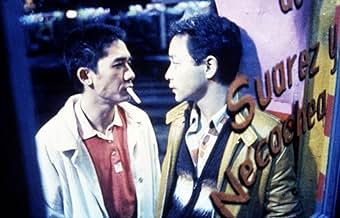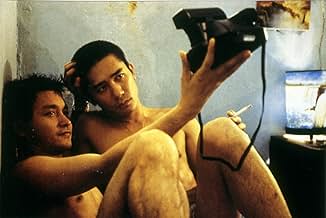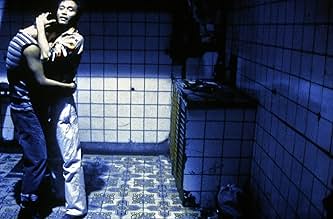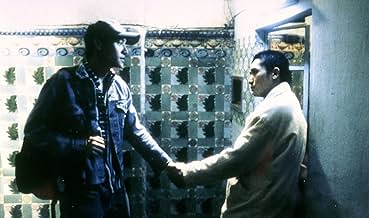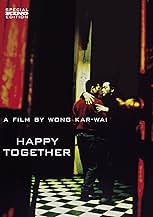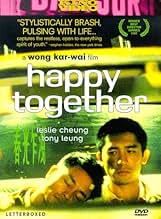अपनी भाषा में प्लॉट जोड़ेंA couple take a trip to Argentina but both men find their lives drifting apart in opposite directions.A couple take a trip to Argentina but both men find their lives drifting apart in opposite directions.A couple take a trip to Argentina but both men find their lives drifting apart in opposite directions.
- पुरस्कार
- 7 जीत और कुल 20 नामांकन
Tony Leung Chiu-wai
- Lai Yiu-fai
- (as Tony Chiu Wai Leung)
Shirley Kwan
- Fai's Girlfriend
- (काटे गए सीन)
फ़ीचर्ड समीक्षाएं
A poignant portrait of a relationship between two men uprooted from their home country, Happy Together explores the ups and downs, the pros and cons of commitment, as the lead characters careen and collide against each other with their discordant personalities acted out wonderfully.
"Happy Together" is a depressing film. Yet it's one which I keep coming back to when I feel down and heartbroken.
Lost souls, lonely, longing, and lovelorn, are staples in the Wong Kar-Wai universe. His best works uncannily portray the beauty and misery of being struck by love and its multiple variations and illusions. His fluid, script-free, improvisational style of work is now legendary and applies well to the unpredictable nature of this subject matter while giving his works a raw, open-ended quality. "Happy Together" is quite probably his rawest work to date and, as a result, one of the most difficult to watch (this honor goes to "Ashes of Time"). The rawness makes it seem organic. It feels as if it's an ever-evolving creature which hides and exposes its multiple facets with each different viewing.
Argentina sounds like a great romantic escape for most of us but for our couple, Po-wing (Leslie Cheung) and Yiu-fai (Tony Leung), it's a lonely, bleak, melancholic place on the edge of the world. Travelogue film this isn't. Buenos Aires may have initially held romantic promise for them. "Let's start over," Po-wing asks Yiu-fai yet again, and off they go to South America to work things out. Soon, however, the place becomes a physical representation of their relationship. It's claustrophobic and oppressive, something that could've been so beautiful yet one which they now need to escape from. Wong beautifully portrays spectacular Iguazu Falls with mythical significance throughout the film. Initially nothing more than amusing kitsch, it eventually progresses as the defining geographical manifestation of their amorous aspirations. It achieves such heavy, symbolic power, the last time we see it is one of the most memorable scenes in the film.
If the homosexual angle seems downplayed here, it is to parallel the film's treatment. It's so matter-of-fact it's irrelevant and even embarrassing to make an issue out of it. This is a couple who just happens to be gay. Indeed, there is nothing gay-specific about the film, the couple may well have been straight and it wouldn't make a difference at all.
"Happy Together" is such a vivid examination of a relationship, it's occasionally painful to watch. The emotional authenticity, however, makes it quite absorbing. Wong Kar-Wai often aims for the heart and, with the possible exception of "In the Mood for Love", he's never been closer to his target.
Lost souls, lonely, longing, and lovelorn, are staples in the Wong Kar-Wai universe. His best works uncannily portray the beauty and misery of being struck by love and its multiple variations and illusions. His fluid, script-free, improvisational style of work is now legendary and applies well to the unpredictable nature of this subject matter while giving his works a raw, open-ended quality. "Happy Together" is quite probably his rawest work to date and, as a result, one of the most difficult to watch (this honor goes to "Ashes of Time"). The rawness makes it seem organic. It feels as if it's an ever-evolving creature which hides and exposes its multiple facets with each different viewing.
Argentina sounds like a great romantic escape for most of us but for our couple, Po-wing (Leslie Cheung) and Yiu-fai (Tony Leung), it's a lonely, bleak, melancholic place on the edge of the world. Travelogue film this isn't. Buenos Aires may have initially held romantic promise for them. "Let's start over," Po-wing asks Yiu-fai yet again, and off they go to South America to work things out. Soon, however, the place becomes a physical representation of their relationship. It's claustrophobic and oppressive, something that could've been so beautiful yet one which they now need to escape from. Wong beautifully portrays spectacular Iguazu Falls with mythical significance throughout the film. Initially nothing more than amusing kitsch, it eventually progresses as the defining geographical manifestation of their amorous aspirations. It achieves such heavy, symbolic power, the last time we see it is one of the most memorable scenes in the film.
If the homosexual angle seems downplayed here, it is to parallel the film's treatment. It's so matter-of-fact it's irrelevant and even embarrassing to make an issue out of it. This is a couple who just happens to be gay. Indeed, there is nothing gay-specific about the film, the couple may well have been straight and it wouldn't make a difference at all.
"Happy Together" is such a vivid examination of a relationship, it's occasionally painful to watch. The emotional authenticity, however, makes it quite absorbing. Wong Kar-Wai often aims for the heart and, with the possible exception of "In the Mood for Love", he's never been closer to his target.
Just when you thought that you knew everything about Hong Kong cinema or about romantic adventures in film, director Kar Wai Wong steps forward and eliminates all boundaries. Transforming your typical picture of a straight couple and violently handing us the relationship of Yiu-fai and Po-wing using untraditional cinematography is only scratching the surface of this picture. If you found yourself shocked by the opening sequence or annoyed by the drastic image of the film, then you definitely are not a film junkie. This movie had everything a cinephile would desire like strong characters, a non-linear story, and the brazen truth about modern society's relationships. This was more than just a gay film, but instead a story about emotions and loves, coupled with all the turmoil that surrounds it. It is ironic that the title of the film is Happy Together, because it completely challenges the true themes. It is about love, but about the difficulties that surround a dying relationship. From the visual opening to the amazing use of several different cinematography techniques, Happy Together may not suit everyone, but to this film junkie it opened a new door in Hong Kong cinema.
This film would not have worked if it weren't for the apparent brilliance of director Kar Wai Wong. While I have been impressed with his other films like In the Mood for Love and his work on the BMW series, The Hire, this film literally blew me out of the water. To begin, the opening sequence. If this very sexual opening doesn't set the tone for the rest of the film, I don't know what will. I was shocked, disturbed, and on-edge the entire time. I didn't see the love between our two characters at all in the beginning, but that was because it was to show the destruction of their relationship. Then, Wong did several things that just impressed me and kept my attention focused on the film. First, he took these two vacationing men from Hong Kong and set them in a foreign city. So, not only was it uneasy to watch this relationship disintegrate in front of our eyes, but to be lost in a unfamiliar city only made it worse. Second, he focused the camera on only one of the characters (Yiu-fai) to enhance that sensation about Po-wing's indiscretions. Through Yiu-fai we felt the human emotions just boil through of having to see a love that only hurt. Finally, he continually changed the cinematography through different scenes. This was impressive because it only added more tension to our characters and themes. Two travelers lost in a foreign country, trying to patch a dying relationship, with a constantly changing cinematic style, was tough to watch but that was the theme that Wong wanted to capture. This is not your typical romantic picture, but instead it showcases the truth about two men that perhaps were not the greatest fit. Even when he throws in the waterfall element, it only adds to the overall theme. The waterfall, to me, represented the falling relationship. Beauty on the outside, a violent tendency as the water falls just like our relationship.
Wong successfully created this tension by hiring some of Hong Kong's best actors. They carried themselves with the greatest of comfort and control. I felt as if I knew these characters by the end of the film. I felt as if I had gone through a similar struggle as they did. These two men challenged the idea of "normal" relationships, yet kept their personas simple, human, and intense. You could not help but feel emotion for these two, even if you did not like the story. They kept the tones light when they needed to be, then brought you deep within the rabbit hole when the darkness erupted. The final scenes of this film are fascinating to watch, and I had to see them again. The downfall of Yiu-fai into a role similar to Po-wing was heartbreaking, yet stunning. Here we have two men who I thought were complete opposites from the beginning, yet somehow, to quote Wong, "Turns out that lonely people are all the same."
Finally, I cannot finish without saying that the cinematography was outstanding in this film. The use of black and white in the beginning and slowly bringing in the colors was breathtaking. This film was more than just actors working for a director, but instead a director creating art. Christopher Doyle bulls-eyed the tone of the film and brought forth an intense picture that only complimented Wong's work. It just impresses me to see a film, like Happy Together, where all the elements come together and work in unison. It is a rarity in today's Hollywood, but thankfully we have directors like Kar Wai Wong whom embrace it. From the beginning of the movie until the final scenes, Doyle challenges an brings together some of the most beautiful scenes in cinema, transforming the normal into the extraordinary.
Overall, this was a spectacular film. After I watched it the first time, I had to see it again, but didn't know if I could. Its emotional strength was so overwhelming that I had to stop myself. I couldn't watch these two brilliant actors tear my heart apart again. It was a sad film, it was an angry film, but most importantly it was a film about being lost in love. Those who may have enjoyed Lost in Translation, this would be a great film to match with it. While not structured the same, it does give us that feeling of being apart in a new world, struggling to get home or to discover one's self. Wong is one of the greatest directors in the world, and I cannot wait to open my soul to his work again. Brilliant film-making, determined and unmatched acting, coupled with the best cinematography this world has ever encountered! A must for everyone!
Grade: **** out of *****
This film would not have worked if it weren't for the apparent brilliance of director Kar Wai Wong. While I have been impressed with his other films like In the Mood for Love and his work on the BMW series, The Hire, this film literally blew me out of the water. To begin, the opening sequence. If this very sexual opening doesn't set the tone for the rest of the film, I don't know what will. I was shocked, disturbed, and on-edge the entire time. I didn't see the love between our two characters at all in the beginning, but that was because it was to show the destruction of their relationship. Then, Wong did several things that just impressed me and kept my attention focused on the film. First, he took these two vacationing men from Hong Kong and set them in a foreign city. So, not only was it uneasy to watch this relationship disintegrate in front of our eyes, but to be lost in a unfamiliar city only made it worse. Second, he focused the camera on only one of the characters (Yiu-fai) to enhance that sensation about Po-wing's indiscretions. Through Yiu-fai we felt the human emotions just boil through of having to see a love that only hurt. Finally, he continually changed the cinematography through different scenes. This was impressive because it only added more tension to our characters and themes. Two travelers lost in a foreign country, trying to patch a dying relationship, with a constantly changing cinematic style, was tough to watch but that was the theme that Wong wanted to capture. This is not your typical romantic picture, but instead it showcases the truth about two men that perhaps were not the greatest fit. Even when he throws in the waterfall element, it only adds to the overall theme. The waterfall, to me, represented the falling relationship. Beauty on the outside, a violent tendency as the water falls just like our relationship.
Wong successfully created this tension by hiring some of Hong Kong's best actors. They carried themselves with the greatest of comfort and control. I felt as if I knew these characters by the end of the film. I felt as if I had gone through a similar struggle as they did. These two men challenged the idea of "normal" relationships, yet kept their personas simple, human, and intense. You could not help but feel emotion for these two, even if you did not like the story. They kept the tones light when they needed to be, then brought you deep within the rabbit hole when the darkness erupted. The final scenes of this film are fascinating to watch, and I had to see them again. The downfall of Yiu-fai into a role similar to Po-wing was heartbreaking, yet stunning. Here we have two men who I thought were complete opposites from the beginning, yet somehow, to quote Wong, "Turns out that lonely people are all the same."
Finally, I cannot finish without saying that the cinematography was outstanding in this film. The use of black and white in the beginning and slowly bringing in the colors was breathtaking. This film was more than just actors working for a director, but instead a director creating art. Christopher Doyle bulls-eyed the tone of the film and brought forth an intense picture that only complimented Wong's work. It just impresses me to see a film, like Happy Together, where all the elements come together and work in unison. It is a rarity in today's Hollywood, but thankfully we have directors like Kar Wai Wong whom embrace it. From the beginning of the movie until the final scenes, Doyle challenges an brings together some of the most beautiful scenes in cinema, transforming the normal into the extraordinary.
Overall, this was a spectacular film. After I watched it the first time, I had to see it again, but didn't know if I could. Its emotional strength was so overwhelming that I had to stop myself. I couldn't watch these two brilliant actors tear my heart apart again. It was a sad film, it was an angry film, but most importantly it was a film about being lost in love. Those who may have enjoyed Lost in Translation, this would be a great film to match with it. While not structured the same, it does give us that feeling of being apart in a new world, struggling to get home or to discover one's self. Wong is one of the greatest directors in the world, and I cannot wait to open my soul to his work again. Brilliant film-making, determined and unmatched acting, coupled with the best cinematography this world has ever encountered! A must for everyone!
Grade: **** out of *****
I didn't think so the first time I saw HAPPY TOGETHER, but I really think this film is a masterpiece. Technically it's amazing - the hand-held camera-work is incredible, and the mindbending shifts from saturated colors to monochrome (which I first felt was a stylish stunt) really underscores the loneliness and alienation of the characters brilliantly - the overall effect by the films' end is devastating.
HAPPY TOGETHER was apparently also - at least partially - inspired by the Argentine novelist Manuel Puig, author of 'Kiss Of The Spider Woman' among many other novels, and Puig's fiction tackles similar issues in a similarly fractured style (filled with footnotes, digressions and sudden shifts in perspective), all to incredibly powerful emotional effect.
If HAPPY TOGETHER is something of an homage to Puig, it's a great one. On it's own it's also a devastating portrait of a disintegrating relationship.
HAPPY TOGETHER was apparently also - at least partially - inspired by the Argentine novelist Manuel Puig, author of 'Kiss Of The Spider Woman' among many other novels, and Puig's fiction tackles similar issues in a similarly fractured style (filled with footnotes, digressions and sudden shifts in perspective), all to incredibly powerful emotional effect.
If HAPPY TOGETHER is something of an homage to Puig, it's a great one. On it's own it's also a devastating portrait of a disintegrating relationship.
Aw-kommon's notes on "Happy Together" are typical of those who cannot approach a film without aligning it with definite paradigms and secure standards. In this case, the paradigm is "Midnight Cowboy" -- a film that belongs to a totally different genre, was written and shot according to "naturalistic" procedures of Hollywood commercial cinema and, most of all, deals with romance from a quite different perspective. In "Midnight Cowboy" redemption of homoeroticism comes through death, a strategy that was quite revealing of the morals that prevailed at the time the movie was produced. "Happy Together", on the other hand, deals with romance as if it could have been homo-, hetero- or whatever, and even though homoeroticism is such an essential element to the narrative, the protagonists'love affair is a pretext for the emergence of their decentered identities, their search for love and friendship and, most important, it ends on a note of hope of future encounters. All that in a poetic tone, one that demands a continuous esthetic reconstruction, hardly understood (or accepted) by those who are encapsulated in a world of conventional filmmaking.
क्या आपको पता है
- ट्रिवियाChang Chen's storyline was completely improvised. Director Wong Kar-Wai discovered the restaurant, China Central, by chance and, seizing Leslie Cheung's absence due to a concert tour, decided to keep shooting. Chang's plot was thus created.
- गूफ़When Po-Wing knocks the packs of cigarettes off the clock, it says 2:38, but then it cuts to another angle of him doing this with the clock saying 3:33, and then it cuts again to the clock saying 2:38.
- भाव
Lai Yiu-fai: Turns out that lonely people are all the same.
- क्रेज़ी क्रेडिटIn some prints, Jacques Picoux (the French subtitle translator) is listed twice in a row in the closing credits.
- इसके अलावा अन्य वर्जनDuring a fire accident in 2019 while the 4K digital restoration was in progress, some of the original 35mm camera negative was lost. In the ensuing months the negative was attempted to be restored as much possible, but a portion of it had been permanently damaged. Lost was not only some of the picture but also the sound in those reels. As a result, Wong had to shorten some of Tony Leung's monologues, but with the work of the restoration crew of L'Immagine Ritrovata, they managed to restore most of the scenes to better quality.
- कनेक्शनFeatured in The Movie Show: 25 मई 1997 को प्रसारित एपिसोड (1997)
- साउंडट्रैकCucurrucucu Paloma
by Caetano Veloso
टॉप पसंद
रेटिंग देने के लिए साइन-इन करें और वैयक्तिकृत सुझावों के लिए वॉचलिस्ट करें
- How long is Happy Together?Alexa द्वारा संचालित
विवरण
बॉक्स ऑफ़िस
- बजट
- $42,00,000(अनुमानित)
- US और कनाडा में सकल
- $3,20,319
- दुनिया भर में सकल
- $15,39,811
- चलने की अवधि1 घंटा 36 मिनट
- रंग
- ध्वनि मिश्रण
- पक्ष अनुपात
- 1.85 : 1
इस पेज में योगदान दें
किसी बदलाव का सुझाव दें या अनुपलब्ध कॉन्टेंट जोड़ें



